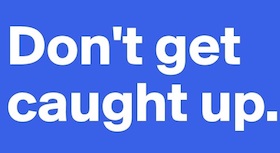
Don’t Get Caught Up
by: Rabbi Jonathan Gewirtz, The Observant Jew
It’s funny how sometimes messages seem to come in groups. I recently wrote about a fellow getting a ticket from a policeman and now I’m writing about that topic again. This time, though, I’m looking at it from another angle.
There’s a famous story about the Chofetz Chaim. He was riding on a wagon when the driver pulled over next to an orchard. Telling the Chofetz Chaim he should be the “lookout,” the man went over and started to pull fruit off the tree. Suddenly, the Chofetz Chaim called out, “He sees you!” The man ran back to the wagon, whipped the horses, and took off at top speed.
He looked back over his shoulder to see if anyone was chasing him but saw no one. Now he was confused. He turned to the Chofetz Chaim and said, “I don’t see anyone there. Who saw me?” The sage replied, “HaKadosh Baruch Hu was watching you.”
Now, I don’t know the end of the story. Perhaps if the driver was an overall G-d-fearing person he acknowledged his error and didn’t roll his eyes at the Chofetz Chaim. However, most people I know would probably have been as annoyed as you can get at a tzaddik because that is clearly not what he meant when he asked for a “lookout.”
The practice of trying to keep people from getting in trouble with the law is quite widespread. A common practice if one passes a patrol car at night is to flash the headlights of your car so oncoming traffic is alerted to its presence and the drivers can slow down, put down the cell phone or maybe even buckle up. You don’t even have to know the other drive to warn him. Similarly, a driver who sees the flashing headlight signal will tend to slow down even if he doesn’t know the driver coming the other way who is giving the signal. We appreciate the warning and change our course to avoid the summons.
One day, police set up a “sting” operation in Monsey. A fellow stood on the sidewalk of a large road. Noting a car coming from the distance, he would step into the crosswalk to see if the car would stop for him. [Authors note: In New York, cars must yield the right of way to pedestrians in crosswalks. When crossing a street not in a crosswalk, the pedestrian must yield to the vehicles, as well as when the vehicles cannot reasonably be expected to yield. That means if a car is 30 feet away going 30 miles an hour, don’t step into the street even at a crosswalk and expect to be fine.
In addition, pedestrians should be sensitive to the needs of drivers by not crossing against lights, by hurrying across when they are blocking traffic, and waving to show appreciation to the driver who let them go. This part is not a state law; it’s the Golden Rule.]
Anyway, if a car did not yield to this “pedestrian,” the police hiding in the bushes would radio to their fellow officers down the road and tell them to pull the car over. A number of cars were pulled over (though they were only given warnings the first day) but more cars were NOT pulled over.
That’s because of the modern day version of flashing the headlights. WhatsApp and text messages spread among the local community like wildfire, alerting people that this operation was underway, where the Police were standing, and what they were doing to drivers. I’m sure many people avoided getting pulled over because of this warning.
I wondered about the ramifications of it. Is it right to do? Well, the Police don’t really want to give tickets for this. They’d prefer that people obeyed the traffic laws. (I know you may not believe me, but let’s make it a hypothetical yes.) The WhatsApped warnings likely spread the message about the law much further than the cops could on their own. Overall, awareness was raised so that’s a good thing.
Let’s repeat: when there was a chance that people would get in trouble, some gave warnings, others accepted, and everyone agreed that they didn’t want the cops to catch anyone. They felt good about protecting others and those warned felt part of a community.
Shouldn’t we take the same position when it comes to mussar and critique? When we see people going down the wrong path, we should want to protect them and keep them from getting in trouble with HaShem, Who, as the Chofetz Chaim said, “is watching.” The problem is that like the wagon driver, people tend to get upset when you equate HaShem with human enforcers of the law. For some reason, He’s not as scary.
While we appreciate people flashing their headlights, we tell people talking about HaShem to lighten up. Like the policeman, HaShem doesn’t want to punish anyone and prefers to raise awareness, but we stop people from helping protect us by our indignation. We’re caught up in the anger that anyone could imply we’re doing something wrong.
I don’t see the difference. I think that when we’re doing something and someone points it out to us, we should be grateful for the guidance and the chance to correct our course.
Of course, when trying to give someone this information, we must not crash our cars into theirs or let the air out of their tires to stop them. Let’s just shine our light and remind them that someone is watching. They’ll get themselves back on the road.
© 2018 – All Rights Reserved
Did you enjoy this column? Feedback is welcome and appreciated. E-mail info@JewishSpeechWriter.com to share your thoughts. You never know when you may be the lamp that enlightens someone else.